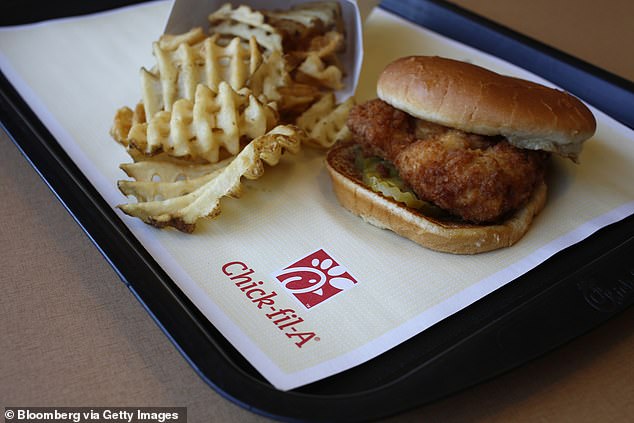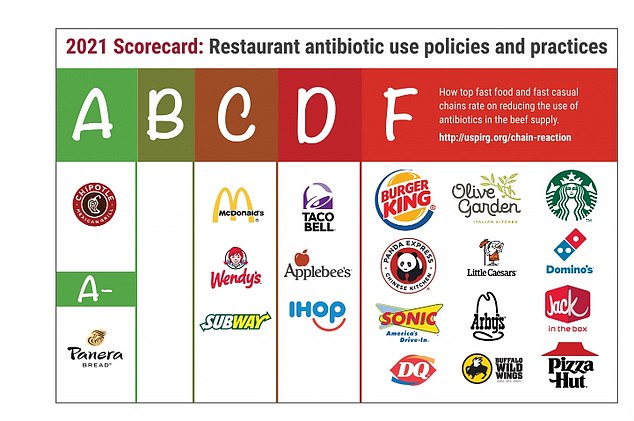A staggering number of popular fast-food chains still use antibiotics in their meat, including major fast-food restaurant Chick-fil-A, which announced it will reverse its promise to remove drugs from its chicken.
The restaurant franchise will use antibiotic-treated meat starting next month, citing lower chicken supplies for its U-turn.
But it is far from the only popular chain selling products containing traces of drugs, contributing to the global threat of antibiotic resistance.
Responsible for millions of deaths worldwide each year, antibiotic resistance describes the process by which common bacteria evolve to be unaffected by the antibiotics used to kill them.
It means that meat bugs that cause food poisoning, such as salmonella and campylobacter, can become indestructible.
DailyMail.com has identified several chains that still use meat raised with antibiotics, including Burger King, Starbucks, Jack in the Box and Dairy Queen.

Chick-fil-A had previously promised to phase out antibiotic use, but, citing a supply problem, decided to abandon that promise in favor of a more limited one to use antibiotics that humans rarely use.


A Consumer Reports survey found that a long list of fast-food chains use meat, primarily beef, treated with antibiotics. The use of antibiotics in livestock can contribute to the development of antibiotic-resistant bacteria
Antibiotics are very effective in treating infections in animals that are going to be slaughtered for consumption.
Cattle typically go through a withdrawal period of a few days before being slaughtered to reduce the amount of drug that leaches into the meat people eat.
While there is no direct and immediate harm from consuming meat treated with antibiotics, doing so could help promote drug-resistant bacteria.
This makes it much more difficult for medications to clear bacterial infections and could mean that a simple case of food poisoning turns fatal.
A previous FDA analysis of animal feed found that of 30 antibiotics used in different types, 18 of them posed a high risk of exposing humans to antibiotic-resistant bacteria through food.
Meanwhile, the CDC estimates that 2.8 million resistant to antibiotics Infections occur every year in the US.
About 660,000 of them are caused by resistant forms of salmonella and campylobacter, two bacteria commonly transmitted by animals slaughtered for human consumption.
The global public health community, including organizations such as the World Health Organization (WHO) and the Centers for Disease Control and Prevention (CDC), identifies antibiotic-resistant bacteria as one of the most significant threats to public health around the world.
According to the CDC, at least 35,000 people in the United States die each year from antibiotic-resistant infections. However, other estimates suggest that this figure could be much higher, potentially exceeding 160,000 deaths per year.
Chick-fil-A He said they work ‘Only real white breast meat, with no fillers, artificial preservatives or added steroids.
Like other chickens in the United States, ours “contains no added hormones.”
Other food chains have pledged to reduce the amount of antibiotics in their meat supplies.
Taco Bell, for example, is aiming for a 30 percent reduction by 2030.
In a Consumer Reports report, the Natural Resources Defense Council called out the efforts of Taco Bell, IHOP and Applebees to reduce the use of medically important antibiotics. in their meat supply chains as ‘D’ for antibiotics in beef.
The report said: ‘As some of America’s largest meat buyers, fast food restaurants can and should act to preserve our life-saving medicines for the future by requiring their meat suppliers to adopt responsible antibiotic use practices. .
‘About a quarter of all medically important antibiotics sold in the US are intended for use in livestock production, which, along with swine production, accounts for more than half of all antibiotic sales in the country.
Burger King, Starbucks, Olive Garden, Panda Express, Little Caesars, Dominos, Sonic, Arbys, Jack in the Box, Dairy Queen, Buffalo Wild Wings and Pizza Hut earned ‘F’ grades.
Chick-fil-A isn’t the only restaurant chain to backtrack on its promise to remove antibiotics from its meat.
Tyson Foods, which processes about 20 percent of all chicken in the United States, abandoned its “never use antibiotics” pledge last July.
The Arkansas-based company had previously become the largest poultry processor to eliminate the use of all antibiotics in its brand’s nuggets, wings and breasts.

